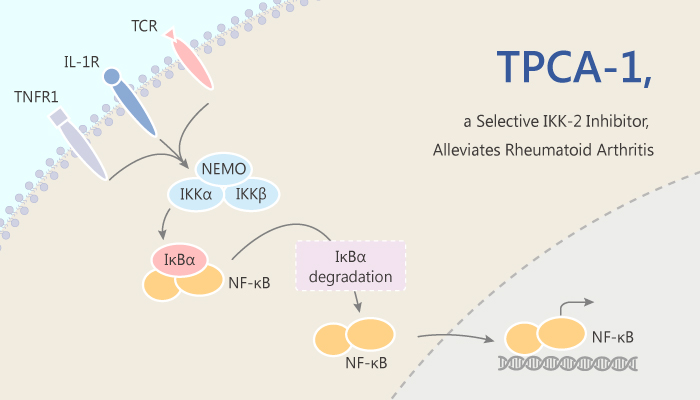IκB kinase 2 (IKK-2) plays a pivotal role in the nuclear factor-κB-regulated production of proinflammatory molecules by stimuli, such as tumor necrosis factor (TNF)-αand interleukin (IL)-1. Thus, inhibition of IKK-2 may be beneficial in the treatment of rheumatoid arthritis.
Rheumatoid arthritis (RA) is a disease characterized by chronic inflammation of the joint. It leads to progressive destruction of cartilage and bone. Meanwhile, many of the proinflammatory molecules associates with RA, like TNF-α, IL-1, matrix metalloproteinase (MMP)-1, and MMP-9. Rel/NF-κB family of transcription factors regulates MMP-1 and MMP-9. Therefore, members of this signaling pathway are potential targets for the development of novel RA therapeutics.
TPCA-1, a Selective IKK-2 Inhibitor, Attenuates of Murine Collagen-Induced Arthritis and Occurs via Reduction of Proinflammatory Cytokines and Antigen-Induced T Cell Proliferation.

In this study, the authors characterize a potent, selective inhibitor of IKK-2, TPCA-1. TPCA-1 inhibits human IKK-2 activity with an IC50 of 19.5 nM. In addition, it exhibits IC50s of 400 nM and 3600 nM against IKK-1 and JNK3, respectively. Furthermore, it is ATP-competitive. On the other hand, TPCA-1 inhibits the production of TNF-α, IL-6, and IL-8 in a concentration-dependent manner. It exhibits IC50s of 170, 290, and 320 nM, respectively. The results suggest that TPCA-1 effectively blocks the NF-κB signaling pathway in intact cells. Prophylactic administration of TPCA-1 at 3, 10, or 20 mg/kg, i.p., b.i.d., resulted in a dose dependent reduction in the severity of murine collagen-induced arthritis (CIA).
In addition, TPCA-1 significantly reduces disease severity and delays disease onset at 10 mg/kg. It is comparable to the effects of the antirheumatic drug, Etanercept administered prophylactically at 4 mg/kg. In addition, administration of TPCA-1 in vivo results in significantly decreased collagen-induced T cell proliferation ex vivo.
In summary, TPCA-1 significantly reduces the severity of murine CIA following prophylactic or therapeutic administration. It inhibits proinflammatory mediator accumulation and collagen-induced T cell proliferation, which is likely the mechanisms underlying modulation of CIA. All in all, inhibition of IKK-2 may be a beneficial approach in the treatment of human disease.
Reference: